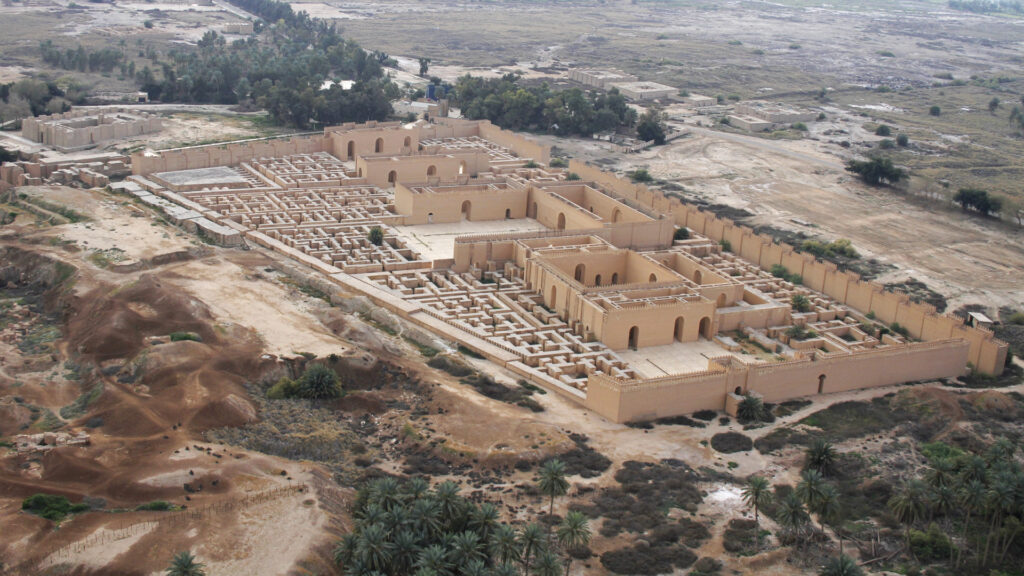Posts by reachchurch
The Fruit Is Gone
Read This Week: Revelation 18
The merchants of the earth will weep and mourn over her because no one buys their cargoes anymore—cargoes of gold, silver, precious stones, and pearls; fine linen, purple, silk, and scarlet cloth; every sort of citron wood, and articles of every kind made of ivory, costly wood, bronze, iron, and marble; cargoes of cinnamon and spice, of incense, myrrh, and frankincense, of wine and olive oil, refined flour and wheat; cattle and sheep; horses and carriages; and human beings sold as enslaved people. They will say, “The fruit you longed for is gone from you. All your luxury and splendor have vanished, never to be recovered.” The merchants who sold these things and gained wealth from her will stand far off. They will weep and mourn. – Revelation 18:11-15 NIV
Revelation 18 is the finality of what the previous chapter sets up – the fall of Babylon. As stated before, Babylon was a powerful empire. This section details the city’s economic, social, and political vitality and prowess. It tells of all the merchandise, clothing, food, spices, and jewelry sold and traded there. Babylon was, by all accounts, an epicenter of the ancient world. It was also a literal and figurative symbol of man’s rebellion against God and the ultimate representative of what it means to be secular. That is why the description of its fall and ultimate demise is so compelling and devastating to the beast’s mission and evil desires.
Because of Babylon’s immense status as a formidable city and as an emblem of the world and anti-God philosophy, John records the warning to followers of Jesus to get out of Babylon before its ultimate end. Verses 4-5 say: Come out of her, my people, so that you will not share in her sins or receive any of her plagues; her sins are piled up to heaven, and God has remembered her crimes.
This warning is a physical and spiritual alert to the believers during Babylon’s fall and a warning for all Christians across generations. It is a reminder that there is nothing the world has to offer to match life with God. No money, wealth, possession, or affluence can provide the meaning and purpose of a relationship with Christ. No status or social standing can bring the value or worth that comes with knowing you are God’s child and made in His image. No position can give one eternal salvation that comes through the blood of the Lamb.
God cautions us to get out of Babylon because it offers nothing of eternal significance for our lives, just temporal, counterfeit pleasure that will not last and will lead to destruction. The Lord makes it clear through John that what Babylon offers will disappear and vanish just like the lies of the enemy and his overtures of a better future. The fruit the world tempts with will be gone. The opulence and comfort that it promises will go away. The glory and fulfillment the world advertises will soon vanish. Only a relationship with God through Jesus Christ and what is done for Him will last forever.
The words of verse 14 should always serve as a reminder of this: The fruit you longed for is gone from you. All your luxury and splendor have vanished, never to be recovered.
The End of Babylon
Read This Week: Revelation 17
The ten horns you saw are ten kings who have not yet received a kingdom but who will receive authority as kings along with the beast for one hour. They have one purpose and will give their power and authority to the beast. They will wage war against the Lamb, but the Lamb will triumph over them because he is Lord of lords and King of kings—and with him will be his called, chosen, and faithful followers. – Revelation 17:12-14 NIV
Revelation 17 describes the categorical victory that Jesus will exact over the beast, his followers, and the totality of his empire. The enemy and his domain will be overthrown, and the religious system he has set up and confused and deceived people with will also be torn down. This demolishing of the false religious scheme is important because it is not enough to eliminate the evil players but to destroy the root of all deception and corruption that has plagued and sought to control people for ages.
The Lord will annihilate Babylon, which has been the epicenter of anti-God philosophy, politics, and activity since Nimrod founded it in Genesis 10. New Testament commentator Warren Wiersbe wrote this about Babylon’s origins and wicked generational influence. He said, “It is ‘the great harlot’ and ‘the mother of harlots.’ The Babylonian system has, in one way or another, given birth to all false religions. She has also seduced people into opposing God and persecuting His servants.” Verses 5-6 of this chapter describe Babylon this way:
The name written on her forehead was a mystery: Babylon the Great, the mother of prostitutes and of the abominations of the earth. I saw that the woman was drunk with the blood of God’s holy people, the blood of those who bore testimony to Jesus.
The spirit of Babylon is alive and well in the modern world. It is seen in the willful denial of the truth and subjective moral reasoning. That which is seemingly deplorable, wrong, and misleading is viewed as admirable, correct, and honorable. Service and benevolence to one’s neighbor are pushed aside for self-interest and egoism. Faith is mocked as a crutch for the mentally weak, and pursuing God is jeered as a thing of the past.
But the Holy Spirit is also alive and powerful in our day. He banners and highlights objective truth as it wins out. He captures minds and hearts to see and recognize what is suitable, appropriate, and virtuous. He places inspiration and guidance in the lives of people to put themselves aside and serve others as Jesus did despite the natural desire to seek their concerns. The Spirit keeps believers strong in faith and emboldens them with passion and persistence when the world persecutes and derides their conviction.
Babylon will be conquered at the end of days, but the blood of the Lamb has effectively defeated it at this very moment. The Lamb of God has already disarmed the powers and authorities; he made a public spectacle of them, triumphing over them by the cross (Col. 2:15). Followers of Jesus have and will endure the wrath of the beast and harlot. Still, they stand behind the cross victorious now and forever. Verse 14 tells us definitively of the enemy’s eternal fate:
They will wage war against the Lamb, but the Lamb will triumph over them because he is Lord of lords and King of kings—and with him will be his called, chosen, and faithful followers.
Armageddon
Read This Week: Revelation 16
Then they gathered the kings together to the place in Hebrew called Armageddon. – Revelation 16:16 NIV.
One important thing to remember when taking in a portion of Scripture, like Revelation 16, is that God is, first and foremost, holy. We speak so much about the character of God and His eternal attributes, which are innumerable, glorious, and unrivaled. We often discuss His love, grace, mercy, goodness, patience, and faithfulness. We highlight His peace, comfort, strength, and omniscience.
All these things are true of the Father, but in recalling these characteristics, we must always recognize that the chief among them is His holiness. The supreme quality cascades, allowing the Lord to be the righteous judge. He is worthy of His seat of judgment and justified in His measures of expression because of His holiness. We must keep this in view always, but especially when trying to absorb parts of the Bible like this one.
There is no way to describe this chapter other than brutal and challenging to read. If you love people and care for others like Jesus does and calls us to, reading the ending account in the series of God’s final judgments is heavy and hard to digest. It tells of the Seven Bowls of God’s Wrath and the ultimate fall of Babylon, leading to the triumphant return of Jesus Christ to earth. It also brings forth a place (or word) known even in secular circles and referenced as a metaphor for fierce battles, destruction, and apocalyptic conflict. That place or word is Armageddon. It means the hill of Megiddo, “the place of soldiers and slaughter.”
Armageddon is a valley that is twenty miles long and fourteen miles wide. It forms a vast natural battlefield that can contain troops, horses, artillery, and combat tech as far as the eye can see. One can stand on the famed Mount Carmel, look out over Armageddon with its topographical grandness, and understand why it is the gathering place of the world’s armies. It also has historical significance, as it was where Gideon faced the Midianites (Judges 7) and King Saul died (1 Samuel 31). Additionally, many encounters happened here during the Crusades of the eleventh through fifteenth centuries and when the British defeated the Turks in 1917.
The nations’ armies assemble here according to God’s will and are led by the enemy and his demonic factions as they prepare for the final battle with Jesus. Before this occurs, God unleashes his final righteous judgment on the earth through the Seven Bowls.
The first is sores breaking out on people and not going away (v.2). The second and third are reminiscent of the Exodus, where the waters turn into blood and contaminate the water supply (v. 3-6). The fourth, the sun will scorch the earth and burn people (v. 8-9); the fifth will see the world covered in darkness and people begging for light with no relief (v.10-11), and the sixth will be the drying up of the Euphrates river (v. 12-16) that will allow for the invasion of the Holy Land by the armies of the east. The seventh and final judgment is a massive earthquake followed by hail that weighs in the neighborhood of a hundred pounds that falls on people (v. 17-21). This chapter is a harrowing and disturbing account of God’s justice for sin.
Take heart and be encouraged through the difficulty of this chapter. The King of Kings is and will be victorious over evil, darkness, sin, and death. The rage and wrath of the nations and the supernatural but limited power of the devil are no match for Him in our present day and will be no match for Him at Armageddon. We currently face threats of war and uncertainty among nations. Still, we can be confident that in our times and the ones to come, God will exact His holiness, righteousness, and triumph that we will take part in for eternity.
The Sound of Victory
Read This Week: Revelation 15
And I saw what looked like a sea of glass glowing with fire and, standing beside the sea, those who had been victorious over the beast and its image and the number of its name. They held harps given to them by God and sang the song of God’s servant Moses and the Lamb: “Great and marvelous are your deeds, Lord God Almighty. Just and true are your ways, King of the nations. Who will not fear you, Lord, and bring glory to your name? For you alone are holy. All nations will worship before.” – Revelation 15:2-4 NIV
John now sees the seven angels holding seven flasks or bottles of God’s wrath. In the previous chapter, the Scriptures told us that the wrath of God would be poured out as judgment on all those who worshiped the Antichrist, took the mark of the beast, and pledged their allegiance to the enemy. It says they will drink the wine of God’s fury, which has been poured full strength into the cup of his wrath (14:10). The Lord is about to exact righteous judgment on His enemies in the form of the “third woe,” but before He does, there is another pause of blessing, spiritual reflection, and praise; to celebrate the impending victory of The Lamb.
These verses describe the revelator witnessing those who have come through the tribulation and endured the beast’s reign. These believers resisted the false prophet and his teaching, refused to take the mark of Satan, and withstood the vicious assault that the dragon unleashed on the world. They did not adopt the satanic system or give in to the mounting influence around them to consent to the evil forces that the devil sanctioned. They also confronted and did not participate in worshipping idols, false gods, and deceitful ideology. They stood firm and faithful at a high cost.
The believers of the tribulation, because they don’t take the mark of the beast, cannot hold jobs or buy and sell merchandise. They often go hungry, live in poverty, and make do with little to nothing. They depend entirely on God for their provision in every area of their lives. Some are thrown in prison, tortured, and publicly beaten, while others are murdered and executed. Yet, they remain faithful to Jesus and the mission of the gospel. They will not waver despite their suffering and will not relent regardless of their anguish. They stay true to God’s word, remain steadfast in His kingdom’s purposes, and lift their voice to make the sound of victory, a sure, eternal triumph that belongs to the King of Kings. Verses 2-4 illustrate this sound of success with these words:
Those who had been victorious over the beast held harps given by God and sang the song of the Lamb: “Great and marvelous are your deeds, Lord God Almighty. Just and true are your ways, King of the nations, for you alone are holy, and all nations will come and worship before you.
The actions, behaviors, songs, and examples of these Christ followers should be an encouragement, blessing, and inspiration to all of us in our time. It provides us with hope and assurance that amid our suffering, we can remain faithful and devoted to the God of the universe and His promises. We don’t have to succumb to the world’s influences or embrace the systems of men just because so many others do. We can stand on the word, speak boldly of love and grace, and make a joyful sound of victory among our family, friends, neighbors, co-workers, and community. We can be victorious because of Jesus.
A New Song
Read This Week: Revelation 14
Then I looked, and there before me was the Lamb, standing on Mount Zion, with him 144,000 who had his name and his Father’s name written on their foreheads. And I heard a sound from heaven like the roar of rushing waters and like a loud peal of thunder. The sound I heard was like that of harpists playing their harps. And they sang a new song before the throne. – Revelation 14:1-3a NIV
Don’t you love listening to and hearing a new song? It’s almost as if we anticipate how it will land in our hearts or how it will pull at our emotions and evoke memories and thoughts.
Revelation 14 is a reprieve from the horror and devastation of chapters 11-13. In it and the following two chapters, we see an emphasis on the voices of God’s people. We see the Lord Himself speaking to His children and those far from Him. But we also see people speaking out and singing out in praise and worship of God. We see them preaching the gospel, warning the world to repent and run to the Father’s loving arms. We read where the remnant and others are lifting their voices to proclaim the good news of Jesus and the finality of the last judgment. We also see them singing a new song because God is doing something new.
We see two distinct and collective voices in this particular chapter. The first one is the voice of 144,000. These are the faithful Jewish people that John described in Revelation 7 that are now standing with God on Mount Zion. The Bible also tells us that this collection of people is lifting their voices to speak and sing. Verses 1-3 say:
There before me was the Lamb, standing on Mount Zion, and with him 144,000 who had his name and his Father’s name written on their foreheads. And I heard a sound from heaven like the roar of rushing waters and like a loud peal of thunder. The sound I heard was like that of harpists playing their harps. And they sang a new song before the throne.
The experiences and terrible nature of the tribulation have not broken their spirits. It has not caused them to turn away from the one true God. It has not given them doubts or pauses about His character, goodness, eternality, and grace. Their struggles have not changed their faith or resolve. Their sorrow has turned into singing and joyful noise. They have separated from the new world order and turned again to the new mercies of God. Their example is quite the encouragement for us living in the trials and turmoil of our day. May we not lose hope and focus on what is happening around us but instead fix our eyes and hearts on an unchangeable, immutable God who constantly does new things that cause us to sing new songs in honor of Him.
The other voices raised in this section are those of the angels. They declared a message of triumph and worship of God and His power and mighty works. Verse 7 describes this time of divine worship in this way:
Fear God and give him glory because the hour of his judgment has come. Worship him who made the heavens, the earth, the sea, and the springs of water.
The angels continue to raise a new song in the heavens around specific acts and things He has done on behalf of Himself, the kingdom, and His people for all time. They sing a new song of the righteousness of God (v.6-7). They sing a new song of the fall of Babylon and the ultimate defeat of the enemy and his evil soldiers who act on his behalf (v.8). They sing a new song of warning about following the beast while allowing an opportunity for repentance and salvation (v.9-13). And they sing a new song of God’s harvest and judgment (v.14-20) and the fall of evil that corrupts, dissuades, and poisons people.
We can sing a new song to God every day in our lives. He always does new things among us in His sovereignty and good pleasure. Something that we can’t predict, understand, or sometimes believe. Yet, He loves us so much that He is still doing things that blow our minds. May we raise our voices, praise His name, and sing of His glory and eternal reign.
The Beast
Read This Week: Revelation 13
The dragon stood on the shore of the sea. And I saw a beast coming out of the sea. People worshiped the dragon because he had given authority to the beast, and they also worshiped the beast and asked, “Who is like the beast? Who can wage war against it?” It also forced all people, great and small, rich and poor, to receive a mark on their right hands or foreheads so that they could not buy or sell unless they had the mark, which is the name of the beast or the number of its name. – Revelation 13:1-4, 16-17 NIV
Chapter 13 continues to unfold the narrative of the evil trio of Satan, the Antichrist, and the false prophet. It isn’t easy to read this portion of Scripture and not be unnerved at the depths of depravity and the notion that God will allow the enemy to unleash his fury and wreak havoc on the earth and all the people who dwell on it. We saw last week that the devil is ultimately not strong enough to overcome the mighty power of God and that he will meet his eternal demise, but the words of verses 7-8 should humble and touch us when it says this about the beast which the dragon empowers:
It was given the power to wage war against God’s holy people and to conquer them. And it was given authority over every tribe, people, language, and nation. All inhabitants of the earth will worship the beast—all whose names have not been written in the Lamb’s book of life, the Lamb who was slain.
That passage reads like something from a Tolkien novel or a Marvel movie. But no science fiction or fantasy writer could truly capture the horror of this part of the tribulation. The idea of the Antichrist possessing the power to wage war against God’s people, conquer them, and have authority over every nation is beyond the finite imagination. He will begin his reign in unifying peace and end it in unimaginable evil and plundering.
Furthermore, another beast (false prophet) will rise, and as verses 12-13 tell us, he will exercise all the authority of the first beast on its behalf and make the earth and its inhabitants worship the first beast. The third beast will perform great signs, even causing a fire from heaven to come to the earth in full view of the people, similar to what the two witnesses of God had done before him. This false prophet will also be the one to force all people to receive the infamous mark of the beast, also known as the number 666. It will be a harrowing time for the world, yet they will inconceivably worship the evil trinity.
The beast will be formidable in his time, but he nor the third beast will be able to overcome The Lamb. In this sense, and for all time, the Lamb of God will win over the beast that resembles a leopard but has feet like those of a bear and a mouth like that of a lion. These foreshadowed events that John captures for us are similar to current times. The spirit of AntiChrist is alive and pervasive in the world, and Christ-followers must not be a part of it, be deceived by it, or succumb to its allure. We must be faithful to Jesus while avoiding false worship and staying on God’s mission to go into all the world and preach the gospel to every person. They need it now and will need it then.
Not Strong Enough
Read This Week: Revelation 12
Then war broke out in heaven. Michael and his angels fought against the dragon, and the dragon and his angels fought back. But he was not strong enough, and they lost their place in heaven. The great dragon was hurled down—that ancient serpent called the devil, or Satan, who leads the whole world astray. He was hurled to the earth, and his angels with him. – Revelation 12:7-9 NIV
Revelation 12 begins a narrative stretch of introducing three central figures in the tribulation – Satan (seen as the dragon), the one who is the false Christ, and the deceitful and false prophet. They will oppose the Lord and Christians in every way. They will try to destroy the people of God and the gospel and unleash havoc, chaos, and torment in a manner never seen on earth. They will confuse the people and even sow unimaginable discord among believers and those wanting to hear the message of salvation through Christ. They will attempt to overthrow the God of the universe once and for all. But they will not succeed.
The first part of the chapter reveals the nation of Israel giving birth to Jesus from the remarkable perspective of the heavens. It details how the enemy tried to prevent Christ from being born and mankind from having a savior and experiencing the love, grace, mercy, and hope of God. Verses 1-5 tell us of this amazing scene:
A woman clothed with the sun, with the moon under her feet and a crown of twelve stars on her head. She was pregnant and cried out in pain as she was about to give birth. The dragon stood in front of the woman who was about to give birth so that it might devour her child the moment he was born. She gave birth to a son, a male child. And her child was snatched up to God and his throne.
John continues on by describing the great war in heaven between Michael, the archangel, and his band of angels against Satan and his followers. It was an intense, supernatural battle that ended with the Devil being thrown out of heaven and losing his place there. Verses 7-9 tell us that Satan and his army fought back furiously, but he was not strong enough. Consequently, he is cast out of his position and made to dwell in this sort of no man’s land, between heaven and earth, where he leads the world astray (v.9) and wages war against humanity, especially those who keep God’s commands and hold fast their testimony about Jesus (v.17). But he is ultimately not strong enough.
The enemy has power, no doubt, but he is not strong enough to overcome the supremacy, authority, and capacity of Almighty God. He was not strong enough to stop the birth of Jesus. He was not strong enough to kill the Messiah as a baby when his parents had to flee the country. He was not strong enough to stop Jesus’ ministry or tempt him in the wilderness or cause him to give up in the garden. Satan was not strong enough to put him to death permanently, keep him in the grave or stop him from overcoming death. He wasn’t strong enough to keep the church from forming and advancing the gospel through the ages.
As the biblical commentator Warren Wiersbe said, “Satan even has access to heaven, where he accuses God’s people, but he cannot dethrone the exalted Savior.” Even in the moments when it looks like Satan is winning, victory is out of reach. Even when he tries to make life unbearable for followers of Jesus, he can’t win. He can’t supersede or overcome the eternal and conquering power of God. He was and is not strong enough.
Both Great and Small
Read This Week: Revelation 11
The seventh angel sounded his trumpet, and there were loud voices in heaven, which said: “The kingdom of the world has become the kingdom of our Lord and his Messiah, and he will reign forever and ever.” And the twenty-four elders, who were seated on their thrones before God, fell on their faces and worshiped God, saying: “We give thanks to you, Lord God Almighty, the One who is and who was, because you have taken your great power and have begun to reign. The nations were angry, and your wrath had come. The time has come for judging the dead and rewarding your servants, the prophets, and the people who revere your name, both great and small. – Revelation 11:15-18 NIV
Chapter 11 is much like Chapter 10 of Revelation, containing some descript, dreadful, and shocking scenes from the middle of the tribulation. The first 14 verses of the passage detail the experience of the two witnesses for Jesus that will testify of God’s power, sovereignty, and salvation for over three years. After they finish sharing the message of Christ in those days, the Enemy will be allowed to come up from the Abyss and attack, overpower, and kill them. Then to make matters worse, the masses will celebrate their deaths, and everyone who sees them will abandon their bodies. Verses 9-10 say:
For three and a half days, some from every people, tribe, language, and nation will gaze at their bodies and refuse burial. The inhabitants of the earth will gloat over them and will celebrate.
But then, after three and a half days, something unbelievable, supernatural, and miraculous will happen. God will bring the two witnesses back to life before the whole world. They will stand up, and the Lord will call them back up into heaven, and the people will be terrified and in awe of God’s power. Furthermore, it will cause them to give glory to the God of heaven. God will redeem this horrible scene in a way that will cause sadistic, unfeeling, and evil people to fall on their faces and worship Him.
This transformation is what God does all the time. He infuses His love, grace, and power into situations that are ugly, vile, and difficult to watch, and transforms, changes, and makes them right. He takes people and any circumstance, both great and small, and redeems them for His glory and our good. Doing so causes the most unlikely individuals, communities, and nations to turn in awe and reverence toward His heart in worship.
The rising from death to life is what He did for us and all those who have and will call on His name. No person, both great and small, is beyond the reach of God’s mercy and love. No situation is too difficult for His mighty strength. No relationship is too complicated for His wisdom. No sickness is too aggressive for His healing hands, and no despair is too oppressive for His freedom. God rules over everything, both great and small, and with this knowledge, we can be confident and say as the twenty-four elders in verses 17-18:
We give thanks to you, Lord God Almighty, the One who is and who was, because you have taken your great power and have begun to reign.
A Testimony
Read This Week: Revelation 10
Then I saw another mighty angel coming down from heaven. He was robed in a cloud, with a rainbow above his head; his face was like the sun, and his legs were like fiery pillars. He was holding a little scroll, which lay open in his hand. He planted his right foot on the sea and his left foot on the land, and he gave a loud shout like the roar of a lion. When he shouted, the voices of the seven thunders spoke. – Revelation 10:1-3 NIV
This chapter begins a section of Revelation that describes the events and movements in the middle of the seven years of tribulation. During this time, the Antichrist comes to power by promising peace, unity, and protection of the Jewish people. Then, after three and a half years, he will go back on his word and violate and infiltrate the temple he helps them rebuild in Jerusalem, thus beginning a season of confusing and brutal persecution of the Jews. It will be an alarming time for everyone on earth and one of great hardship. But the people of God will not be without testimony in the world among all of the disorder and reign of evil.
Chapter 10 tells us about the testimony of the mighty angel. Verse 1 says that he was robed in a cloud, with a rainbow above his head; his face was like the sun, and his legs were like fiery pillars. This fantastic description and scene of power and majesty are reminiscent of the Lord. The elements of the rainbow, sun, and fire are those used to describe Jesus himself. The angel holds a scroll with the rest of the revelation that John will record and provide. Earlier, we saw that Jesus is the only One worthy to break the seal and unravel the scroll, and it would make sense that He would be the One to deliver the rest of the message.
Earlier in Revelation 5, we also saw that Jesus is the long-awaited Lion of the tribe of Judah, and here, in verses 2-3, it says He planted his right foot on the sea and his left foot on the land, and he gave a loud shout like the roar of a lion. If indeed this angel is the Lord Jesus Christ, that indicates that amid all the rampant chaos of evil, spiritual disobedience, and the command of terror under the Antichrist, there is still a powerful testimony of Christ in the world. The presence and power of Jesus will be preeminent even though it will look like the Enemy is gaining a foothold and winning. He will still be under the power and authority of Christ in the latter days, and many witnesses will rise and testify to God’s goodness and salvation.
This testimony of the angel should encourage us for the future and in the here and now. It should inspire us to testify to God’s love, grace, mercy, and forgiveness through Jesus Christ amid our present age’s seeming despair and desperation. It should encourage us to share our testimony of salvation and how the Lion of Judah has changed us, how He rescued us from darkness and the control of sin and set us on a new, eternal path of righteousness. A testimony could make all the difference for someone in our lives and generations to come.
Woe Is Past
Read This Week: Revelation 9
During those days, people will seek death but not find it; they will long to die, but death will elude them. The first woe is past; two other woes are yet to come. – Revelation 9:6 & 12 NIV
Revelation 9 is a challenging read. People often comment that some Bible sections present problems in understanding and difficulty absorbing some implications and realities. This particular chapter and chapter 8 fit into this category and are unlike any we have read in the study to this point. These passages present one of the book’s significant movements involving judgment. They describe two terrifying armies liberated at a strategic time and allowed by God to judge humankind, thus presenting things to us that are hard to ingest but are part of the Lord’s redemptive plan.
The first army that John describes is from the Abyss or the pit. This Abyss is not the final and eternal place set aside for the Enemy but part of that realm under God’s authority. When the pit opens, verse 2 says that smoke rose from it like the smoke from a gigantic furnace. The smoke from the Abyss darkened the sun and sky. The smoke damages the atmosphere, but what is truly horrific is what comes out of the smoke. The Bible says it was an army of demons numbered like locusts that terrorized humankind and caused pain and agony.
They are not locusts; however, they are described as horses prepared for battle. Their faces resembled humans, and their teeth were like a lion’s. They had breastplates of iron and tails with stingers, like scorpions, and in their tails, they had the power to torment people for five months (v.7-10). Even though we endure exposure to many graphic images of war and violence in our day and age, we can barely comprehend this type of judgment and suffering.
The second army in Revelation 9 is from the east and was twice ten thousand times ten thousand. It was an underworld liberation army of 200 million. The number alone is scary and intimidating. This army is not unleashed to torment and harass through stinging hurt, but they are released to kill a third of the world’s population. Yet, after five months of death, distress, and unimaginable affliction to the modern mind, the people do not feel remorse for their wickedness and denial of God. Verses 20-21 provide the unfortunate response of all the rest to the judgments and chances to repent and turn toward God:
The rest of mankind who were not killed by these plagues still did not repent of the work of their hands; they did not stop worshiping demons and idols of gold, silver, bronze, stone, and wood—idols that cannot see or hear or walk. Nor did they repent of their murders, their magic arts, their sexual immorality, or their thefts.
As followers of Christ, we should be thankful that Jesus holds the keys to hell and death and possesses divine authority over Satan and his armies. We should be humbled and alerted by these words but also motivated and reaffirmed in our mission; to be used by God as vessels and mouthpieces for the gospel. To demonstrate and share the love and message of Jesus with everyone with whom we come in contact. To communicate the sobering truth of God’s righteous judgment while reflecting on the goodness of his grace and the eternality of his salvation. To express to others that woe is past when we are in Christ, and no others are yet to come.









